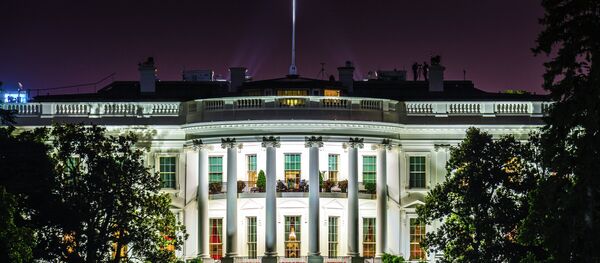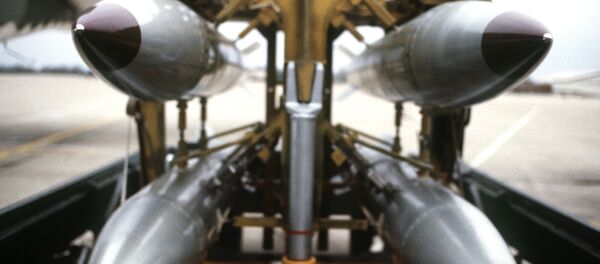The cornerstone of America's foreign and military policy is the Wolfowitz Doctrine which declares that Washington's primary objective "is to prevent the re-emergence of a new rival, either in the territory of the former Soviet Union or elsewhere that poses a threat similar to that posed formerly by the Soviet Union," Dr. Paul Craig Roberts, a prominent American economist, former Assistant Secretary of the Treasury for Economic Policy and author, elaborated.
"By ‘threat' the Wolfowitz Doctrine means a country sufficiently strong enough to have a foreign policy independent of Washington. ‘Threat' does not mean a military threat or a plan to attack the US. It means any country capable of standing up to Washington. Today there are two such countries, Russia and China. While the Washington neoconservatives were absorbed in their decade-long wars in the Middle East, Vladimir Putin revived Russia from the Yeltsin debacle, and China rose much more rapidly than Washington expected," Dr. Roberts told Sputnik.
"When Russia (possibly backed by China) forced diplomatic solutions on the Syrian and Iranian ‘crises' that Washington had orchestrated as an excuse for military action [against these countries], the neoconservatives realized that Russia had acquired the power to limit American unilateralism," Dr. Roberts pointed out.
Predictably, Washington struck back. Dr. Roberts pointed out that the next move of the US was to overthrow the government of Ukraine, hoping to grab the Russian Black Sea naval base, thus depriving Russia of access to the Mediterranean.
"The sanctions alleviate Washington's concerns that Europe's dependency on Russian energy will eventually cause Washington to lose control over Europe," Dr. Roberts noted.
'Tensions with Russia are Absolutely Required'
Furthermore, the Pentagon's top officials have publicly labeled Russia as America's "existential threat," stressing that it is the only country on earth that retains the nuclear capability to destroy the United States. What is the root cause of Washington's warmongering?
"Washington always needs an enemy in order to justify the $1 trillion annual budget of the military/security complex. When the Soviet Union collapsed, this budget was in jeopardy until the "Muslim threat" was created. The problem with the Muslim threat is that Muslims lack ICBMs, navies, air forces, and armies that can be portrayed as "existential threats" to the US," Dr. Roberts told Sputnik.
While some experts suggest that America's anti-Russia's stance may be caused by emerging domestic problems and the prospect of new global financial crisis, Paul Craig Roberts explains that "the demonization of Russia and Russia's president have nothing to do with the current or future state of the US economy."
"It has to do with the Wolfowitz Doctrine," the American author stressed.
So, what steps should be taken by the White House and the Kremlin in order to de-escalate the growing tension between the US and Russia?
"The Russian media keeps asking me this question: "What steps, in your opinion, should be taken by the US and the Russian government to de-escalate the tension?" This is a nonsensical question! Washington has no intention whatsoever of de-escalating the tension. From Washington's standpoint, the tension is absolutely essential," Dr. Roberts told Sputnik.
Dr. Roberts pointed out that tensions with Russia are "absolutely required," since the neoconservatives, the politicians, and the profits and power of the military/security complex desperately need this conflict.
While the Russian government is committed to diplomatic solutions, Washington considers diplomacy a sign of weakness.
"The Russian government relies on diplomacy, but Washington regards diplomacy as a sign of weakness. Washington relies on coercion. Washington intends to coerce Russia into submission. It is a mystery to me how the Russian government and Russian media can miss so obvious an intent," the author underscored.
A Serious Temptation to the Chinese
Meanwhile, Russia is bolstering its economic and political ties with China prompting some analysts to consider BRICS and the Shanghai Cooperation Organization (SCO) a viable alternative to the established institutions of the West.
However, that does not mean Washington will twiddle its thumbs just watching the emerging powers establish new geopolitical alliances.
"Washington is now apparently launching its plan to break up the Russian-Chinese alliance before it can solidify. The International Monetary Fund (IMF), a Washington-controlled institution, is courting China with bringing the Chinese currency into the IMF's money, Special Drawing Rights, as a heavily weighted currency, second only to the US dollar," Paul Craig Roberts elaborated.
And this is quite tempting to the Chinese, Dr. Roberts warned, given that they are currently besotted with capitalism and money-making.
"Of course, if Washington's plan succeeds, after Russia is finished off, China will be next. Wisdom and awareness are rare in the world, and this rareness is a great benefit to Washington," Dr. Paul Craig Roberts concluded.







